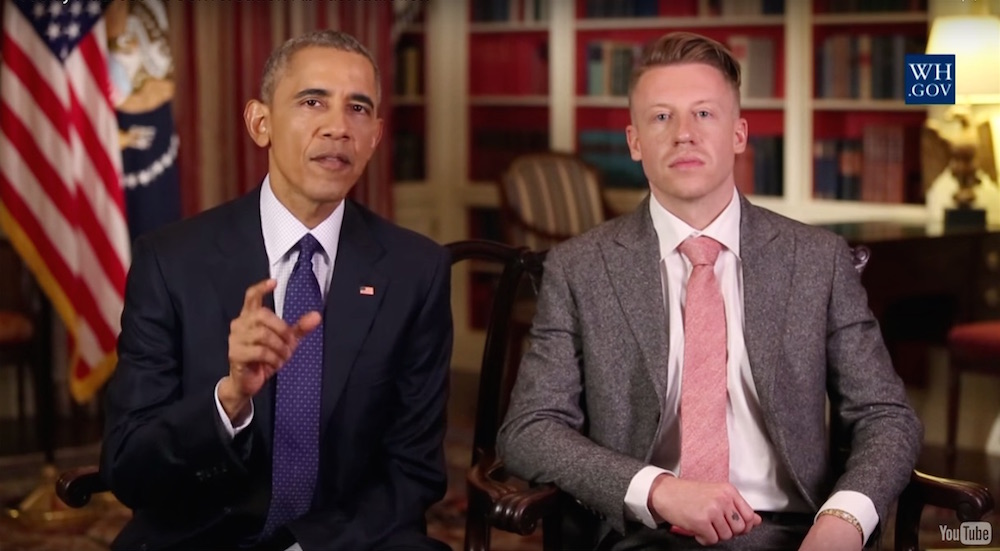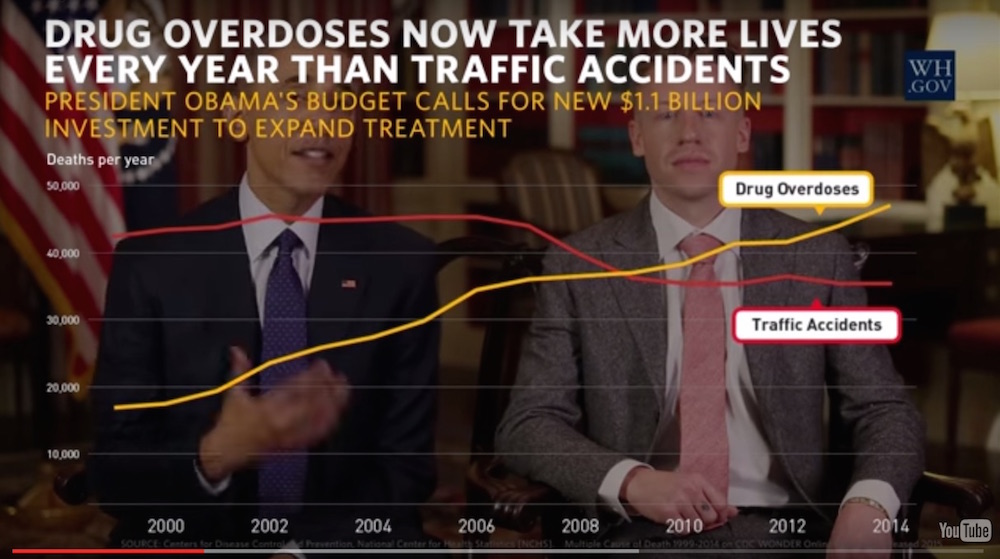Macklemore Tells Obama About How He Once Abused Prescription Drugs

If you're wondering why prescription drugs containing opioids are so addictive, just ask Grammy Award-winning rap artist Macklemore.
This past Saturday (May 14), Barack Obama invited Macklemore to talk about opioid addiction during the president's online weekly address at the White House.
"I'm here with President Obama because I take this personally," Macklemore said in the video. "I abused prescription drugs and battled addiction. If I hadn't gotten the help I needed when I needed it, I might not be here today." [Top 10 Leading Causes of Death]
Drug overdoses now kill more Americans every year than traffic accidents do, and deaths from opioid overdoses have tripled since 2000, Obama said in the video. Opioid drugs are a top killer in the United States.
But why are these drugs so deadly? Scientists say it has to do with how the medications affect the brain.
Opioid addiction
Prescription opioids such as OxyContin and Vicodin are used in medicine to help people manage moderate to severe pain. Once taken, these medications attach to specific proteins, called opioid receptors, that are found in the brain, spinal cord, gastrointestinal tract and other organs, said Dr. Nora Volkow, director of the National Institute on Drug Abuse.
"When these drugs attach to their receptors, they reduce the perception of pain and can produce a sense of well-being," Volkow said in a 2014 presentation to the U.S. Senate. "However, they can also produce drowsiness, mental confusion, nausea and constipation."
Get the world’s most fascinating discoveries delivered straight to your inbox.
In particular, opioids' effects usually occur via a subset of opioid receptors, ones that are activated by the body's own opioid chemicals, such as endorphins, Volkow said. When a person takes external opioids repeatedly, the body stops making its own opioids. That means that when a person stops using these drugs, he or she can feel extreme discomfort (known as withdrawal), Volkow said.
Some people misuse prescription drugs on purpose to get a euphoric high, Volkow said. This group might crush pills and then snort or inject the powder, or combine the pills with alcohol or other drugs, she said. Other times, people mistakenly take prescription pills incorrectly, such as taking too many pills at once, or taking them more frequently than prescribed, she said. It's also possible that a small number of people become addicted to prescription opioids even after following the doctor's directions, Volkow said.
Opioid overdoses
Opioid addiction can be a lifelong struggle, and can have severe consequences, V said.
When people take opioid drugs repeatedly, they can develop tolerance over time. This means that the individuals no longer respond to the drugs as strongly as they used to, and so they often take a higher dose to achieve the desired effect, Volkow said. [The Drug Talk: 7 New Tips for Today's Parents]
"This tolerance contributes to the high risk of overdose during a relapse," she said. People who stop using the drugs for a time may lose some of their tolerance for the drugs, but may not realize it. If they take a high dosage during this time, they can easily overdose, Volow said.
Every day, 44 people in the United States die after overdosing on prescription drugs, the U.S. Department of Health and Human Services reported. The majority of these deaths are due to opioids, the department said.
"I didn't just know someone — I lost someone," Macklemore said. "My friend Kevin overdosed on painkillers when he was just 21 years old."
Both Macklemore and Obama said they hope to raise awareness about opioid addiction so that people who need help will seek and get it. To find local treatment, call 1-800-662-HELP, Macklemore said.
Macklemore, who is 32, has talked about his prescription-drug and alcohol addictions before, The Seattle Times reported. The artist, whose real name is Ben Haggerty, was arrested at age 15 and wound up in juvenile drug court, The Seattle Times said, adding that the musician entered rehab in 2008 and is now sober.
More footage of Macklemore and Obama's discussion about opioid addiction will air on MTV this summer, the White House reported.
Follow Laura Geggel on Twitter @LauraGeggel. Follow Live Science @livescience, Facebook & Google+. Original article on Live Science.

Laura is the managing editor at Live Science. She also runs the archaeology section and the Life's Little Mysteries series. Her work has appeared in The New York Times, Scholastic, Popular Science and Spectrum, a site on autism research. She has won multiple awards from the Society of Professional Journalists and the Washington Newspaper Publishers Association for her reporting at a weekly newspaper near Seattle. Laura holds a bachelor's degree in English literature and psychology from Washington University in St. Louis and a master's degree in science writing from NYU.



